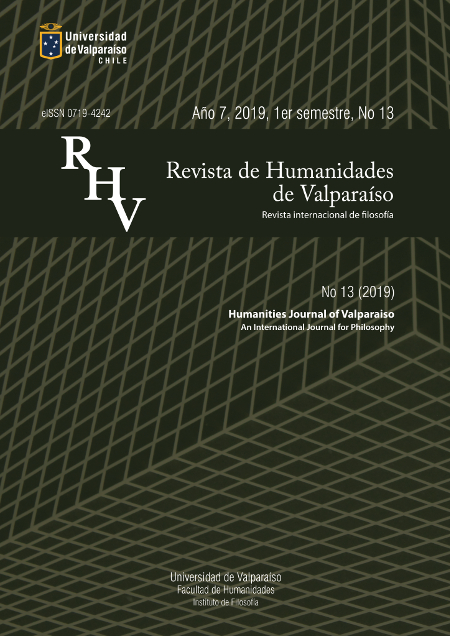Sobre las reglas de predicador e indexicalidad
DOI:
https://doi.org/10.22370/rhv2019iss13pp18-33Palabras clave:
lenguaje ortodoxo, reglas de predicador, inferencialismo, elecciones, dialógica, semánticaResumen
Argumentamos que ningún intento de reducir el significado a un conjunto sistemático de reglas, según el cual el papel de las expresiones lingüísticas debe definirse normativamente, puede abstraerse de un compuesto irreductiblemente decisional. Comparando el proyecto de Lorenzen de construir un lenguaje ortodoxo (Orthosprache) con el enfoque inferencialista de Brandom sobre el significado, distinguimos aquí dos formas de reconocer este hecho. Afirmaremos entonces que el enfoque de Lorenzen es más genuinamente constructivo, en la medida en que las elecciones se consideran características genuinas de las construcciones. Esto nos llevará a una nueva perspectiva de la relación entre el constructivismo dialógico y el intuicionismo de Brouwer. De esta manera, presentamos un argumento filosófico para la afirmación de que las reglas de interacción deben indexarse en relación a los jugadores y sus elecciones, al proporcionar bases deónticas a la semántica.Descargas
Citas
Becker, O. (1927). Mathematische Existenz. Tübingen: Niemeyer.
Brandom, R. B. (1994). Making it explicit. Reasoning, Representing and Discursive Commitments. Cambridge, Massachussets and London: Harvard University Press.
Brandom, R. B. (2000). Articulating Reasons. An introduction to Inferentialism. Cambridge, Massachussets and London: Harvard University Press.
Brouwer, L.E.J (1975). Collected Works. Ed. by Arend Heyting. Amsterdam: North-Holland.
Brouwer, L.E.J. (1928). Die Struktur des Kontinuum. Wien: Komitee zur Veranstaltung von Gastvorträgen ausländischer Gelehrter der exakten Wissenschaften.
Dummett, M. (1978a). Can Analytical Philosophy be Systematic, and ought it to be? In Truth and other Enigmas. Cambridge: Harvard University Press.
Dummett, M. (1978b). The Philosophical Basis of Intuitionistic Logic. In Truth and other Enigmas. Cambridge: Harvard University Press.
Kamlah, W., Lorenzen, P. (1996). Logische Propädeutik: Vorschule des vernünftigen Redens. Stuttgart, Weimar: Verlag J. B. Metzler.
Le Roy, E. (1930). La Pensée intuitive, II. Invention et Vérification. Paris: Boivin et Cie.
Lorenz, K. (2010). Logic, Language and Method. Berlin: De Gruyter.
Lorenzen, P., Lorenz, K. (1978). Dialogische Logik. Darmstadt, Germany: Wissenschaftliche Buchgesellschaft.
Lorenzen, P., Schwemmer, O. (1975). Konstruktive Logik, Ethik und Wissenschaftstheorie. Mannheim: Bibliographisches Institut A.G.
Martin-Löf, P. (2017a). Assertion and request. Lecture held at Oslo. Transcription by A. Klev. (no published work)
Martin-Löf, P. (2017b). Assertion and request. Lecture held at Stockholm. Transcription by A. Klev. (no published work)
Peirce, Ch. S. (1974). Collected papers of Charles Sanders Peirce. Ed. By Charles Hartshorne and Paul Weiss. Cambridge, Massachussets: The Belknap Press of Harvard University Press.
Rahman, Sh. et al. (2018). Immanent Reasoning or Equality in Action: A Plaidoyer for the Play Level(Logic, Argumentation & Reasoning Series). Dordrecht: Springer International Publishing.
Schneider, H. J. (1999). Phantäsie und Kalkül. Über die Polarität von Handlung und Struktur in der Sprache. Frankfurt am Main: Suhrkamp.
Schneider, H. J. (2014). Wittgenstein’s later Theory of Meaning. Trans. by Timothy Doyle and Daniel Smyth. Chichester, UK: Wiley Blackwell.
Wittgenstein, L. (1984). Philosophische Untersuchungen. Frankfurt am Main: Suhrkamp.
Descargas
Publicado
Cómo citar
Número
Sección
Licencia
Aquellos autores/as que tengan publicaciones con esta revista, aceptan los términos siguientes:
- Los autores/as conservarán sus derechos de autor y garantizarán a la revista el derecho de primera publicación de su obra, el cual estará simultáneamente sujeto a la Licencia de reconocimiento de Creative Commons (CC BY-NC-ND 4.0 International) que permite a terceros compartir la obra siempre que se indique su autor y su primera publicación esta revista.
- Los autores/as podrán adoptar otros acuerdos de licencia no exclusiva de distribución de la versión de la obra publicada (p. ej.: depositarla en un archivo telemático institucional o publicarla en un volumen monográfico) siempre que se indique la publicación inicial en esta revista.
- Se permite y recomienda a los autores/as difundir su obra a través de Internet (p. ej.: en archivos telemáticos institucionales o en su página web) antes y durante el proceso de envío, lo cual puede producir intercambios interesantes y aumentar las citas de la obra publicada. (Véase El efecto del acceso abierto).






